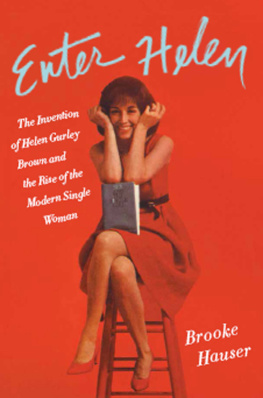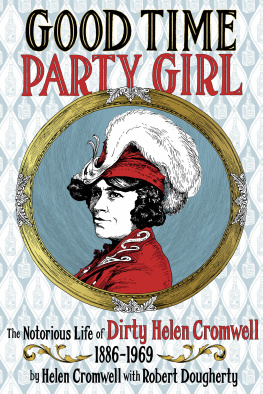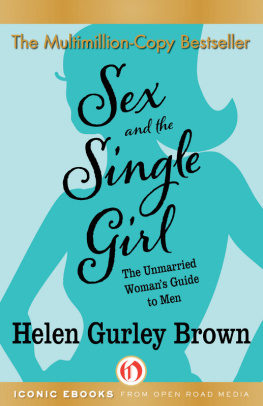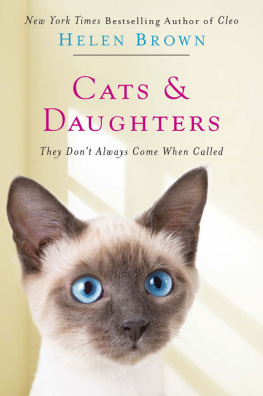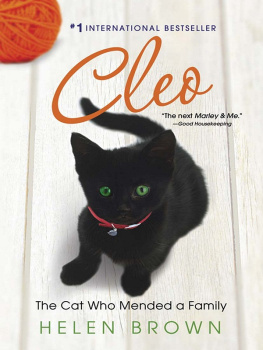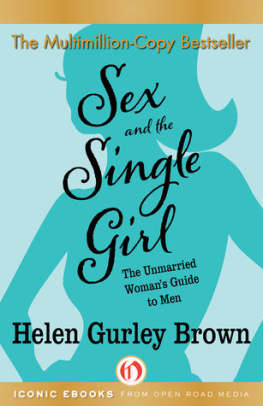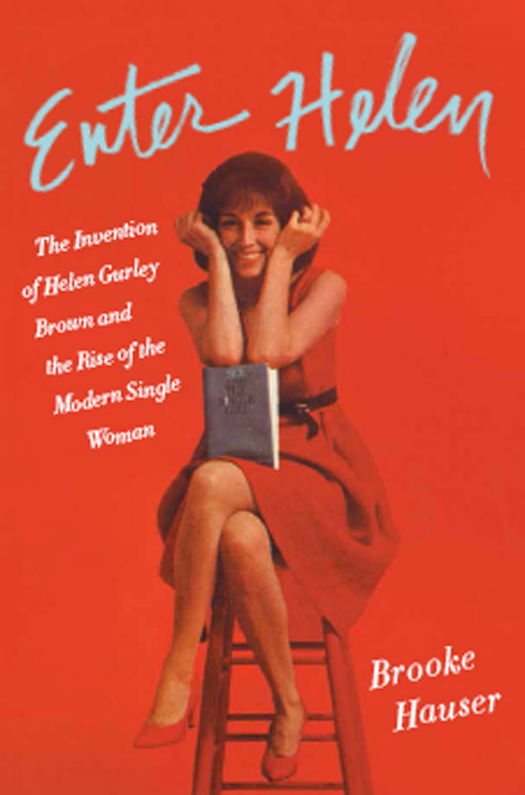To my parents, Terry and Michelle Hauser, the best of partners;
and to my husband, Addison MacDonald,
whom I lean on and look forward to seeing every day.
Funny business, a womans careerthe things you drop on your way up the ladder so you can move faster. You forget youll need them again when you get back to being a woman. Thats one career all females have in common, whether we like it or not: being a woman.... And in the last analysis, nothings any good unless you can look up just before dinner or turn around in bed, and there he is. Without that, youre not a woman. Youre something with a French provincial office or a book full of clippings, but youre not a woman.
Margo Channing (Bette Davis), in All About Eve, 1950
She is such a feeling person that her work is almost surely colored by her own sensitivities. But her work is her kingdom, alas, only eight hours per day. As mentioned above, she is a feeling being. She is completely aware of her own longingsto be needed, to be reassured that she is attractive and desirable, to belong intimately somewhere to someone. She is all Woman.
from a 1957 job evaluation of Miss Helen Marie Gurley, a copywriter at Foote, Cone & Belding
CONTENTS
Guide
Oh well hes got that je ne sais quoi While I, my dear, am from Arkansas
from an early poem by Helen Gurley
I n the early Seventies, Helen Gurley Brown began working on a musical about her life, tracing her rise from a mousy girl from Little Rock, Arkansas, to the legendary editor of Cosmopolitan magazine. It was a story she had told countless times before, but this time her writing partner, a Cosmo contributor named Lyn Tornabene, was helping her to turn it into a spectacle worthy of Broadway.
They envisioned a play about a lady who knewall out of the context of her timethe power of sex. Set in Depression-era Arkansas, Los Angeles, and New York, it would unfold in several acts, with razzle-dazzle musical numbers like Going All the Way (one of the worst sins a girl could commit); Sex Is Power (followed by a series of passion ballets, featuring beds onstage and male dancers as Helens favorite ex-lovers); and Helen, an ode to the patron saint of single girls, the editor of Metropolitan magazine (subbing for Cosmopolitan), and the ultimate authority on such subjects as how to boff in a wig or bag a rich man. Over the course of the play, many different characters would walk on and off the stage, though the most important stage direction of all was the simplest: Enter, Helen.
But which one? There was the young Helen: scrawny, flat-chested, and acne-ridden with crooked teeth and limp, brown hair, a timid and pitiful creature. And then there was the grown Helen: a sophisticated, stylish, and sexy woman who had transformed herself from a mouseberger into the most famous editor in the world, a woman who, in one scene, tells her fawning secretary, Anybody can be me. You just have to work at it.
In a flash of inspiration, the playwrights decided to create a duet for both Helens. Picture the scene: The grown Helen begins singing to herself as she primps in the mirror, putting on false eyelashes and a hair fall. Meanwhile, a soft light illuminates another spot on the stage. Pale and frail-looking in her cap and gown on graduation day, young Helen appears, lamenting her blah looks and wondering aloud, in her small, shaky voice, what will become of her future self. They called this song Look at Me, aka The Mouseberger Blues.
Over the years, Lyn spent countless hours interviewing Helen, digging out the backstory that would become the basis of the play. Once, at Helens Park Avenue apartment, she made supper, Lyn says, a salad with lemon juice and mineral oilits also a laxative! She had a little jar of Bacos, and then she made one scrambled egg that we shared. And Diet Jell-O.
Other times, Lyn went into the city to pick Helen up and take her back to her house in Greenwich, Connecticut. After Helen did her morning floor exercises in Lyns guest room upstairsthump, thump, thumpthey got to work. They talked about single girls and sex and men and affairs and consequences. Helen remembered girls shed known who had come to her after getting pregnant; girls she had listened to and counseled through abortions and rejections, after the men went back to their wives. But mostly, she remembered the girl she had been.
During those sessions, they talked about Helens childhood in Arkansas. Helen told Lyn about the tragic death of her father, Ira, and the fog of depression her mother, Cleo, never quite escaped, even after remarrying. (She later took the last name Bryan.) Other characters they chose not to develop, like Helens older sister, Mary, who lived in Oklahoma. A victim of polio who spent most of her life in a wheelchair, Mary was quietly determined in her own way, but Helen and Lyn decided she would be better as a foila muted, gentle soul to bring out the sparkle of Helens personality.
They titled the musical Helen and eventually shared the beginnings of a script with an agent, who shopped it around. But it never sold. It was too soon. The producing world is a mans world on Broadway. They werent ready to worship Helen, Lyn says. Its so sad. She wanted it very badly.
Helen filed the idea away, but she never forgot about it. Nearly two decades after they started writing Helen, she brought it up with Lyn once again. Nothings doing with the musical, she said, but Im still trying.
Enter Helen.
1958
All my life, ever since I was a little girl,
Ive always had the same dream. To marry a zillionaire.
Loco Dempsey (Betty Grable) in How to Marry a Millionaire, 1953
H elen Gurley loved the idea of David Brown long before she loved him. What wasnt to love? As head of the story department at 20th Century Fox, he was one of the most eligible bachelors in Hollywood, and according to a mutual friend, Ruth Schandorf, charming, intellectual, and gentle as a baby lamb. He had been something of a whiz kid after graduating from Stanford and the Columbia School of Journalismeditor-in-chief of Liberty magazine and then managing editor at Cosmopolitan. Twice divorced, he had a son with his first wife, a teenage boy who was almost old enough to go to college. Perhaps most intriguingly of all, David lived in an elegant house in the Pacific Palisades section of Los Angeles, and he made an annual income of $75,000. Not including expense accounts.
When Helen first heard that David was single again, she felt her hopes flit around in her rib cage. At forty-two, he was what she had begun to think of as collectors-item age, more worldly than her bachelor friends in their meager twenties, with less mileage than widowers in their thick-in-the-middle sixties. David Brown was clearly marriage material, but the first time Helen asked Ruth to fix them up, she advised against it. Its too soon, Ruth said. You should wait until hes ready for a sensible girl like you. Davids second wife, Wayne Clark, had left him for another man, and in the aftermath he had been finding some comfort in the arms of starlets.
No one who knew Helen Gurley well would have described her as patient, but she was sensible and self-aware. She hadnt stayed single for thirty-six years without getting to know herself, and shed never forgotten the lesson she had learned as a starry-eyed twenty-four-year-old legal secretary working for Paul Ziffren, back when he was still a young tax attorney at the Los Angeles law firm Loeb & Loeb. Helen was a lousy legal secretary, partly because she found the work so boring, but working for Mr. Ziffren had its perks. Namely, it kept her in meat and men. Meat, as Mr. Ziffren once gave her ten pounds of bacon as a gift (a client, Vons market, had given it to him) at the peak of rationing in the Forties, and she and her mother and sister had eaten it for eight days straight. And men, as the firm represented several wealthy entrepreneurs looking to buy or sell exclusive properties, and her job put her in close contact with all kinds of Possibles. When she wasnt typing up depositions, Helen fantasized about what it would be like to be the wife of Texan investor Joe Drown, who had just purchased the Hotel Bel-Air. Marrying into money wouldnt solve all of her problemsMary would still be in a wheelchair, and Mother would still be depressedbut at least they wouldnt be poor.

